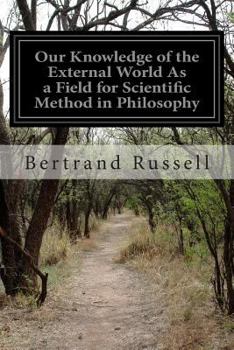Our Knowledge of the External World As a Field for Scientific Method in Philosophy
Select Format
Select Condition 
Book Overview
This collection of literature attempts to compile many of the classic works that have stood the test of time and offer them at a reduced, affordable price, in an attractive volume so that everyone can enjoy them.
Format:Paperback
Language:English
ISBN:150553948X
ISBN13:9781505539486
Release Date:December 2014
Publisher:Createspace Independent Publishing Platform
Length:96 Pages
Weight:0.31 lbs.
Dimensions:0.2" x 6.0" x 9.0"
Customer Reviews
2 ratings
Book Summary -- Our Knowledge of the External World
Published by Thriftbooks.com User , 20 years ago
"Our Knowledge of the External World" first appeared as a series of lectures delivered by Bertrand Russell while in Boston in the early spring of 1914. Fifteen years passed before Russell published these Lowell Lectures with the goal of introducing his "logical-analytic method" to the wider general public with the express purpose of finding "whatever objective scientific knowledge it is possible to obtain" (v). In writing this book Russell also hoped to stake a future claim for philosophy. The barrage of scientific and mathematical discoveries during the early 20th century brought into question the future relevancy and legitimacy of philosophy. For Russell, philosophy found itself at a critical juncture, "Philosophy, from the earliest times, has made greater claims, and achieved fewer results, than any other branch of learning," with Russell's position being, "The problems and the method of philosophy have, I believe, been misconceived by all schools, many of its traditional problems being insoluble with our means of knowledge, while other more neglected but not less important problems can, [through Russell's Logical Atomism], be solved with all the precision and certainty to which the most advanced sciences have attained" (11). Russell envisioned a very specific purpose for philosophy, but realized that his brand of "Logical Atomism" would have to first overcome the entrenched "classical tradition" of Immanuel Kant and "evolutionism" of Herbert Spencer that was popular at the time. Russell wrote that his interpretation of what philosophy should be "is to help us to understand the general aspects of the world and the logical analysis of familiar but complex things" (22). Philosophy's success in achieving these ends may then provide an ancillary boon to the other sciences. Russell writes, "The philosophy, therefore, which is to be genuinely inspired by the scientific spirit, must deal with somewhat dry and abstract maters, and must not hope to find an answer to the practical problems of life" (31). In Russell's opinion both the classical tradition and evolutionism erred by presuming that either reason or intuition provided the path to truth. Concerning this false demarcation Russell writes, "insight, untested and unsupported, is an insufficient guarantee of truth...insight is what first leads to the beliefs which subsequent reason confirms or confutes (24-25)," and finally "It is neither intellect nor intuition, but sensation, that supplies new data...intellect is much more capable of dealing with [sensations] than intuition" (28). In contrast, Logical Atomism rejected the classical notion of a priori reasoning in favor of a deductive science based raw sense-data. The basic premise of Logical Atomism is that all knowledge is ultimately reducible to problems of logic. According to Russell we build this stock of "common knowledge" through either acquaintance (i.e. direct experience) or description (i.e. vicarious experience). While he conc
Masterpiece
Published by Thriftbooks.com User , 21 years ago
This book is like a sculpture. Think of Russell as a Michelangelo of analytic philosophy and think of this book as one of his sculptures. You will be looking at his work from different angles, from the distance or from close vicinity, and you will appreciate its many aspects, you will go back and notice details that you missed, and, most important of all, when Russell will comment on the limits of his investigation, you will learn to love the imperfection of his masterpiece. This book is clear and well written, but that doesn't come as a surprise, knowing the author. Russell will capture the reader in his thoughts. His main point throughout the book is giving a logically sound account of reality. The three main arguments are about space, time and infinity. I recommend this book to anyone who is interested in reading a logical, accurate, elementary clear and well written account of the reality that surrounds us. Those readers who have, once in their lives, wondered if time exists, if there can be a definition of "number" and if infinity can be described, will think of this book as a treasure.






